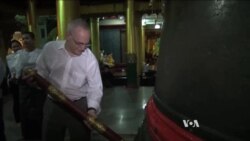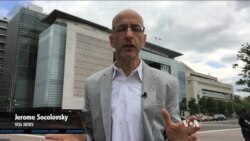The U.S. State Department on Wednesday will release its annual International Religious Freedom report, a country-by-country catalog of the treatment of religious groups around the globe.
Congress mandated the report in a 1998 law that made religious freedom a priority of American foreign policy and created a bureaucracy to promote it. Nearly two decades later, the underlying aims and the effectiveness of the International Religious Freedom Act are being vigorously debated.
While proponents say the report has given hope to persecuted peoples, critics allege the advocacy of religious freedom by U.S. diplomats has become an exercise in neocolonialism.
“Religious freedom has become the civilizing discourse of our time,” said Elizabeth Shakman Hurd, a professor of politics at Northwestern University. She noted that Canada set up an Office of Religious Freedom two years ago, while the European Union is also making it a policy priority.
In the United States, the 1998 law also created a special ambassador-at-large position and a bipartisan U.S. Commission on International Religious Freedom (USCIRF), with the possibility of sanctions for violators. The result has been numerous congressional hearings and a proliferation of nongovernmental groups, many tied to religious organizations.
Inspiration or Taliban-baiting?
“It’s been incredibly supportive and inspiring to beleaguered religious communities across the globe,” said Rabbi David Saperstein, appointed last year as the first non-Christian religious freedom ambassador.
He said diplomatic pressure has been placed on governments to ease restrictions such as blasphemy laws. And, he said, it has forced U.S. diplomats to forge relationships with myriad religious communities, especially small, persecuted ones. Every U.S. embassy must have a person on its staff writing its country’s section of the International Religious Freedom report, he said.
“Before the report, it was the overlooked piece of the busy lives of staff people at embassies,” Saperstein said in an interview in his office in the State Department. “This forced them to engage seriously. So as I traveled the world in these last 15 years, time and again I heard, ‘What a difference this structure made.' ”
Katrina Lantos Swett, chairwoman of the USCIRF, which puts out its own annual survey of countries, said, "There’s a lot of evidence out there, from many credible sources, that societies that do a good job protecting this fundamental human right ... also tend to be more peaceful. They tend to be more economically prosperous.”
WATCH: Merits of Religious Freedom Debated
Hurd, who recently led a seminar on religious freedom efforts at the Transatlantic Academy in Washington, said the efforts often distort foreign policy. By exaggerating the importance of religious identity, they sometimes go so far as to have a “Taliban-baiting” effect, directing the attention of extremists to vulnerable religious groups.
“When they’re [the groups] singled out for protection on the basis of religion, that actually can make things more difficult for them paradoxically,” she said, citing exclusionary policies toward Christians in Pakistan and Muslims in Myanmar. She said she thought the civil war in Syria had been turned into a religious conflict, in part, by Western advocacy groups and by the regime of President Bashar al-Assad itself, which has used the threat of sectarian anarchy to justify its own rule.
Mixed results
Even supporters concede that the results of the American religious freedom effort have been mixed.
Thomas Farr, former director of the State Department’s Office of International Religious Freedom and now a Georgetown University professor, testified before Congress in 2013: “It would be difficult to name a single country in the world over the past 15 years where American religious freedom policy has helped to reduce religious persecution or to increase religious freedom in any substantial or sustained way.”
The USCIRF chairwoman herself admitted that after 17 years of international religious freedom advocacy in U.S. diplomacy, success is hard to pin down.
“If I were to give a grade, the grade I would give is an incomplete,” Lantos Swett told a conference of the Religion Newswriters Association last year.
Hurd, the political science professor, said the very premise of the effort is based on a double standard.
Religious freedom
“We see ourselves as having achieved religious freedom, it’s something that we have,” she said. “But when it comes to other people, we need to manage it, we need to teach them to be tolerant, we need to reform them — which is something that the government, paradoxically, would never do at home.”
That’s because the U.S. Constitution prohibits government from meddling in the religious practice of citizens.
The difficulty — some say impossibility — of achieving absolute religious freedom for everyone came into sharp relief recently with the controversy over the Religious Freedom Restoration Act. It’s the domestic precursor of the international act, adopted as a federal law in 1993, and has since been adopted by many states.
With same-sex marriage now legal in the United States after a Supreme Court ruling earlier this year, conservative Christian florists and caterers have sought to use state RFRAs to opt out of providing services for gay and lesbian weddings, triggering protests from gay rights groups.
And with regard to foreign policy, some critics of the international religious freedom effort say there’s an ulterior motive: to make the world safe for Christian missionaries.
Spreading Protestant values?
“The U.S. campaign for international religious freedom is very much a religious campaign,” Belgian political scientist Jakob de Roover wrote several months ago on firstpost.com, an Indian news website. “It seeks to spread Protestant-Christian values across the world but does so under the guise of promoting and protecting human rights that are ‘universally held sacred.’ ”
De Roover wrote his article in response to the designation of India as a “country of concern” in this year’s USCIRF report because of anti-conversion laws in six states and increasing “incidents of religiously motivated and communal violence.”
He maintained that USCIRF is motivated by historical Protestant views of Hinduism as a “false religion” and a desire to make sure Indians have the right to convert.
“For the U.S. commission, this freedom to follow one’s own conscience always overrides other concerns — say, for instance, the worry often voiced in India that Christian missionary activity constitutes aggression upon the traditions, sensitivities and harmony of a community,” De Roover wrote.
Marjan Keypour Greenblatt, director of the U.S.-based Alliance for Rights of All Minorities, said such arguments are actually patronizing toward non-Westerners.
“The assumption, that the aspiration of religious freedom is a Protestant notion, is in and of itself an ethnocentric and Western-centric ideology,” she wrote in an email, noting that the idea was championed long ago by the Zoroastrian king of Persia, Cyrus the Great.
Keypour Greenblatt, who grew up in Iran, said arguing against religious freedom is tantamount to favoring “religious nationalism.”
“I saw the consequences firsthand in the Islamic Republic of Iran,” she added, “where the post-revolution, sharia-inspired constitution granted certain religious minorities such as Christians and Jews secondhand citizenship, imparted ambiguity around the rights of some groups, such as Sunni Muslims, and categorically deprived the followers of the Bahai faith, an aboriginal religion of the country, of any rights whatsoever.”






